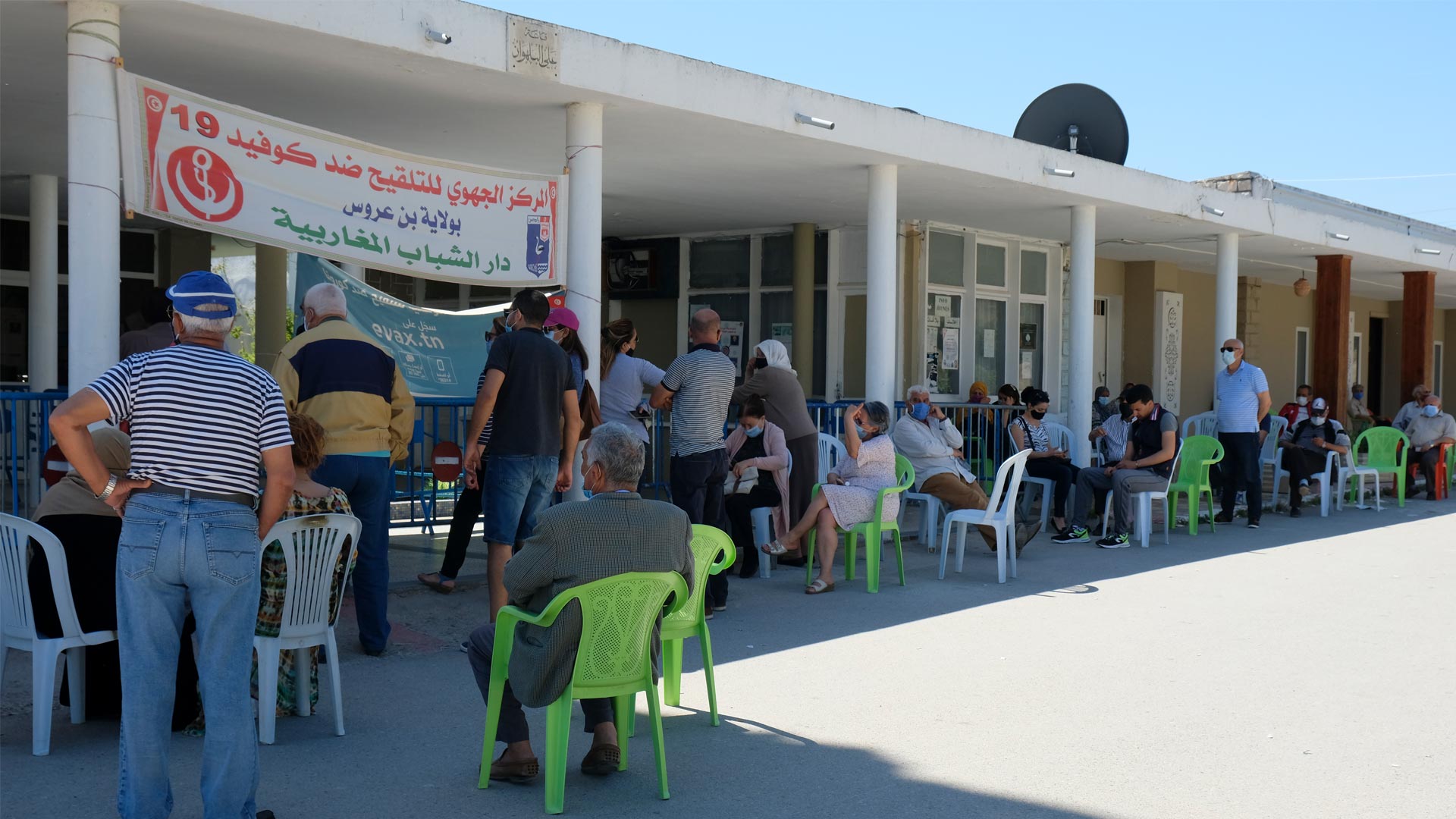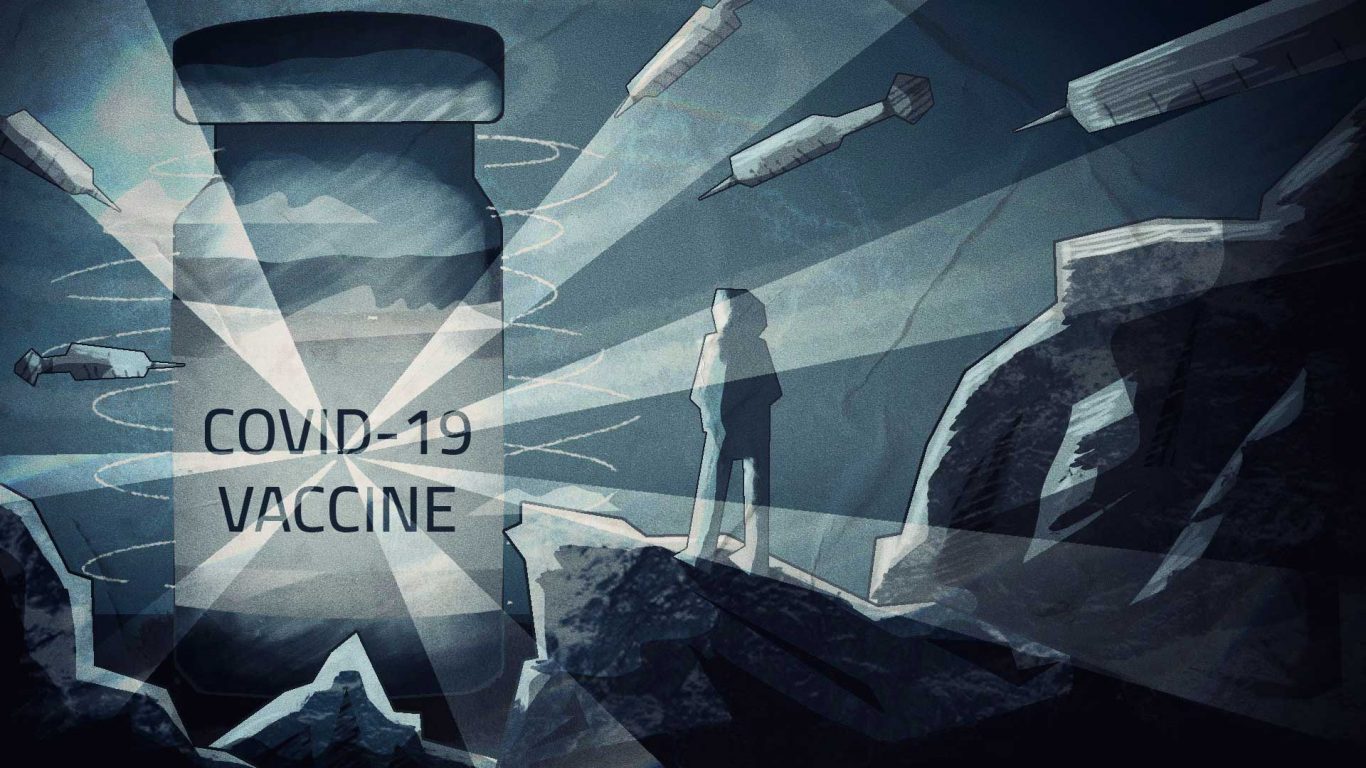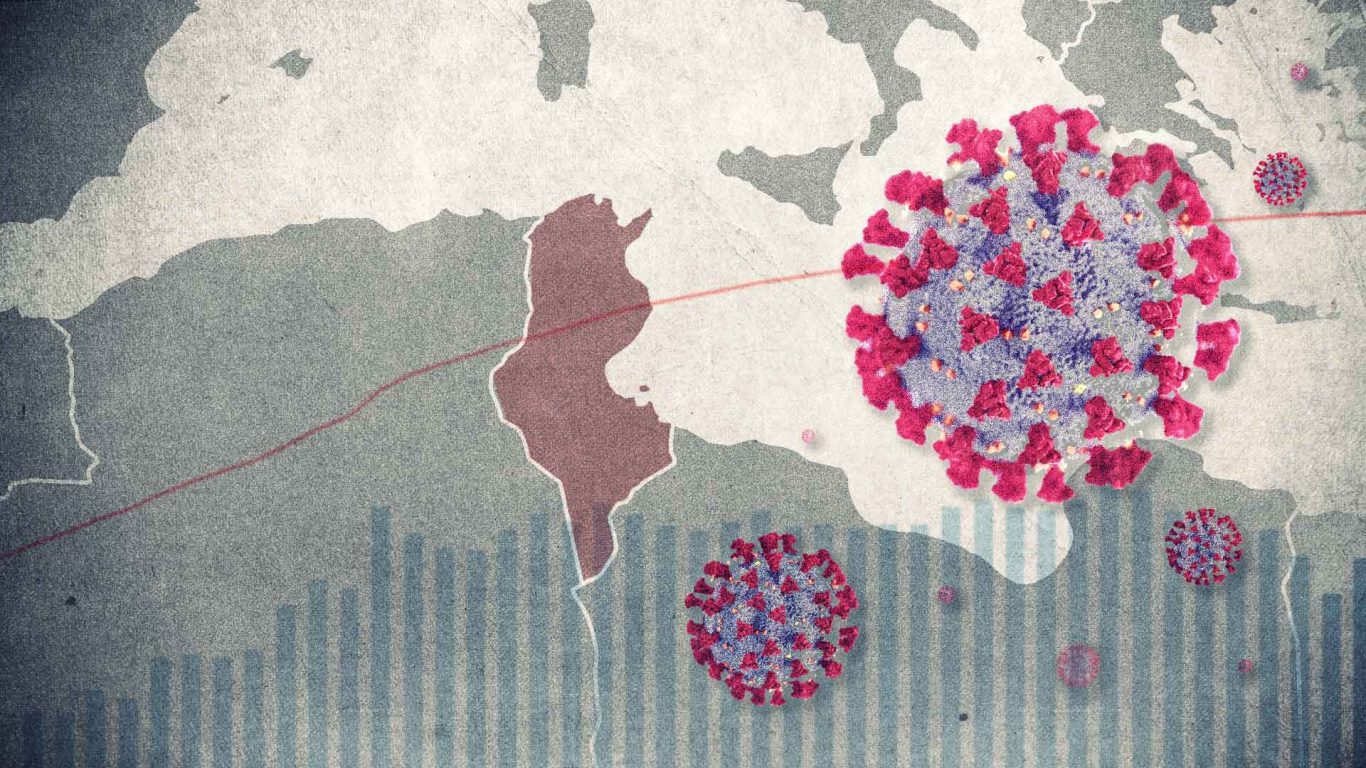In this cramped theatre, in the sweltering heat, health care professionals have been rehearsing the same show for weeks. At the back of the room, a group of nurses prepare the syringes. To their left, the pharmacists monitor the refrigeration of the vaccines and manage the inventory of doses, syringes, cotton pads and alcohol. The doctors check the health of the patients, and monitor the side effects during the 15 minutes following the vaccination, while a second group of nurses, equipped with their syringes, vaccinate the new patients.
At the beginning of the year, the authorities announced their objective of 3 million vaccinated people by June 30, 2021. As of June 10, only 354,000 people had received both doses of the vaccine. What explanation can be given for this delay?
On the same subject
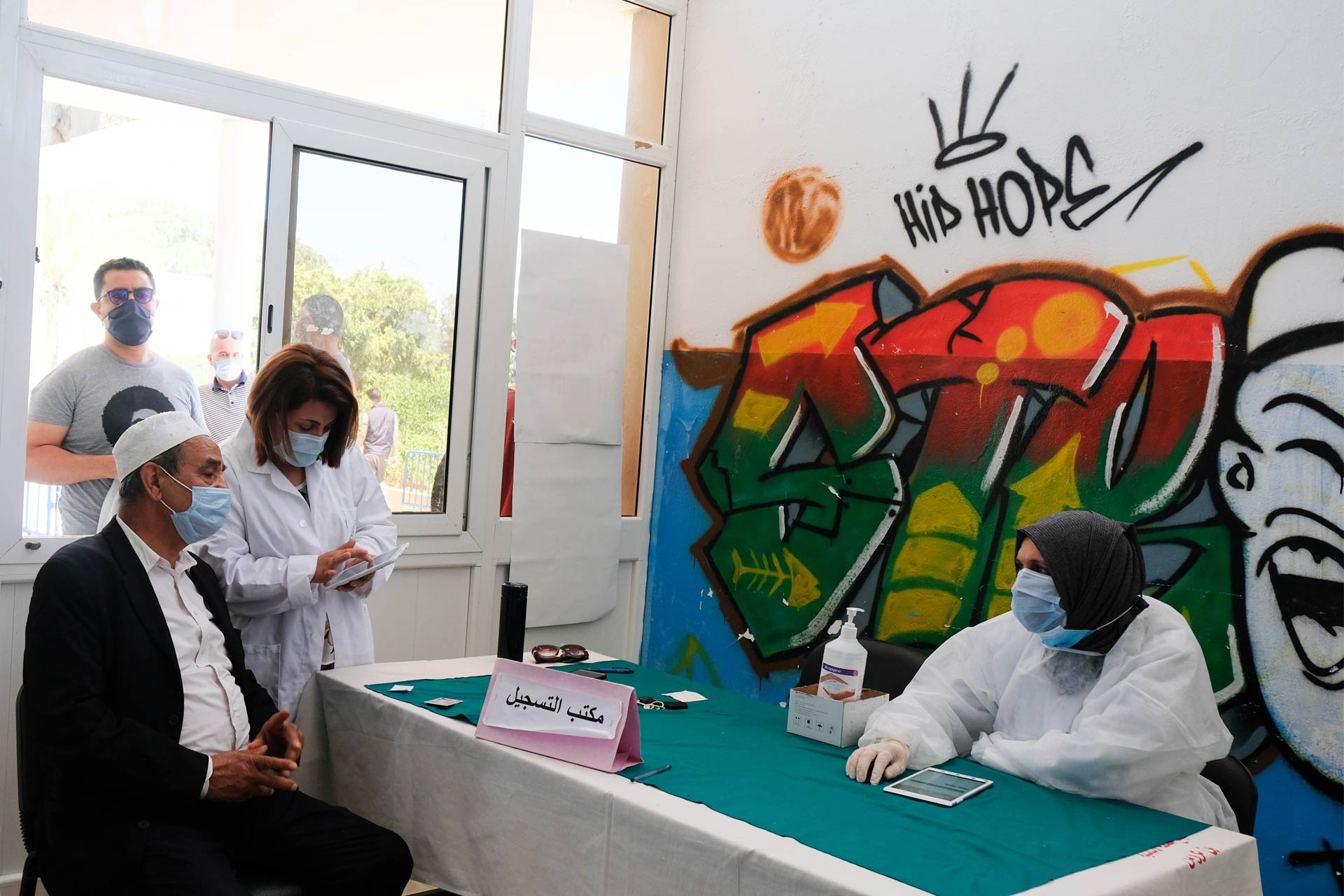
The doctor checks the medical history and any possible contraindications before the vaccination.
OVERSATURATED VACCINATION CENTRES
In large centres such as the one in Rades or the Ariana Cultural Centre, around 1,000 people are vaccinated every day. "We can't do more with the material and human resources at our disposal", explains Seif, a pharmacist who has been requisitioned in Rades.
Beyond the maximum capacity, which varies between centres, it is the lack of staff that limits the number of people who are able to get vaccinated. "Honestly, I am telling you, we are overwhelmed", declares Feriel Ferchiou, director of the Ariana centre. Between the first appointments at 8.30am and the last ones at 4.30pm, the staff does not have a minute to spare.
On the same subject
In addition to the tasks assigned to each of them, they have to deal with numerous unscheduled situations: making the multiple earlybird patients wait, sorting out an internet crash or an 'E-vax' bug, reassuring the anxious... All this with a team of no more than twenty people.
"We won't be able to hold out for long", Seif laments. This specialist pharmacist has seen his daily life transformed since the start of the vaccination campaign. In addition to the two or three days a week spent at the centre, he continues to work at the Ben Arous Hospital for Burn Victims, whilst also providing supervision and training for the interns.
A frantic pace that leads to stress, mental and physical fatigue, and is not compensated with any kind of bonus. Another pharmacist, also exhausted by the intense vaccination scheme, denounced the absence of recuperative leave for pharmacists within the hospital and health care sector, which only allows them to rest for two days a month. With the coming heat, working conditions are likely to become even more challenging.
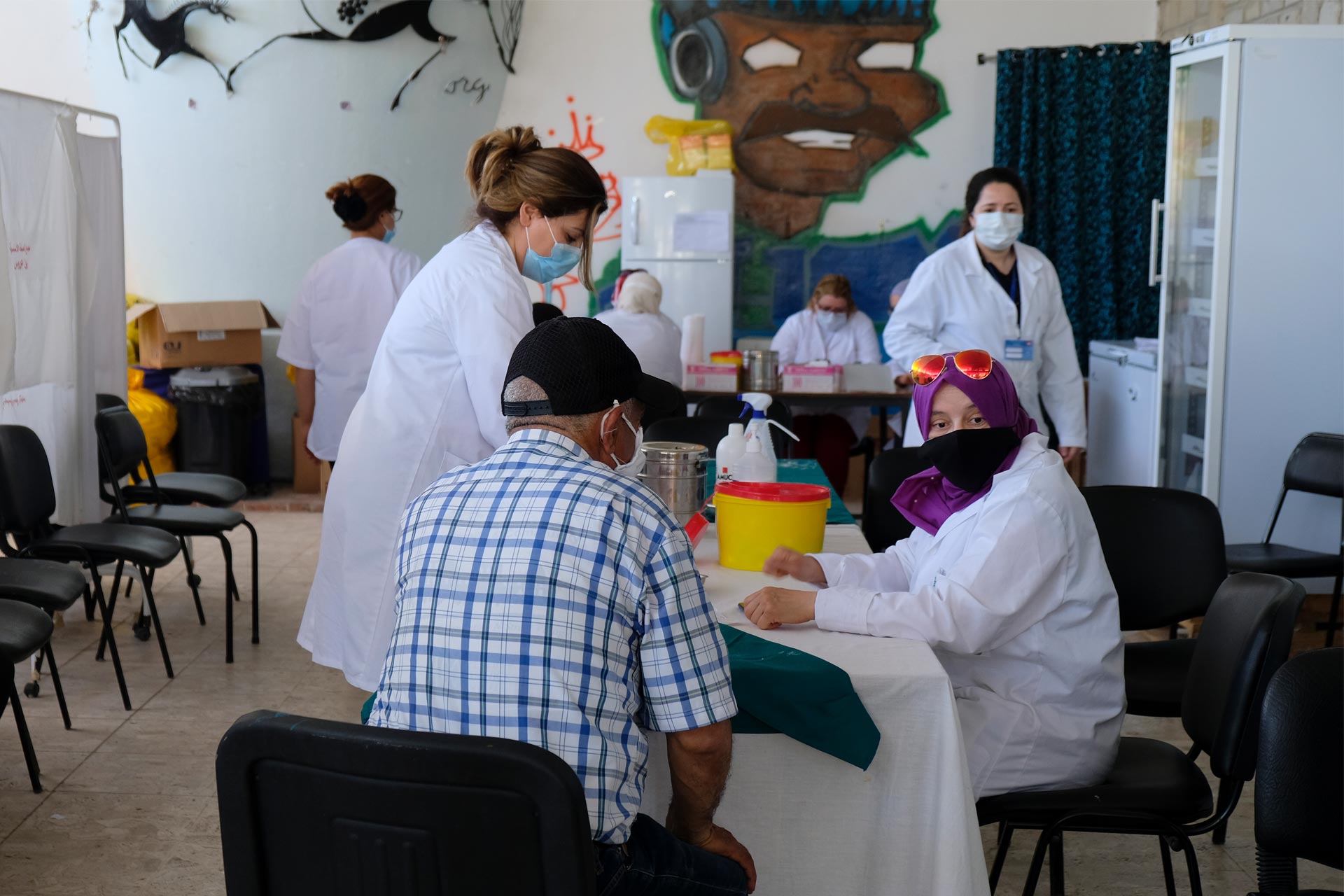
A patient before the injection.
Eager to contribute to the collective effort, the vaccination staff are trying to keep up. "Even if the conditions are not the best, the staff is genuinely very motivated. We feel that we are doing something for the country, for the citizens", explains the director of the Ariana centre.
While only 70 vaccination centres out of the 300 declared have been opened, the health staff is adamant: under these conditions, it is impossible to vaccinate at a faster pace. According to Ines Ayadi, communications advisor to the Minister of Health, the government is expected to extend vaccination sites to pharmacies and basic health centres by July. She also says that mobile campaigns that are targeting specific audiences (teachers, the elderly, prisoners) are on the rise, but any exact numbers on such initiatives remain unclear so far.
On the same subject
ASTRAZENECA, THE VACCINE THAT TUNISIANS DON'T WANT
There are times, however, when vaccination centres are not running at full capacity. For example, on days when the AstraZeneca vaccine is being administered, the number of patients drastically drops. According to the centre's director, only 340 people were vaccinated at the Rades Youth Centre on May 31, the day that AstraZeneca was being administered, compared to 1013 vaccinations on June 2 when it was Pfizer. Feriel Ferchiou reported the same observation in her centre:
"We had the same number of appointments, 1200 or so, and [only] a third of them were vaccinated, maybe less. People didn't quite accept this vaccine."
The reason for this scepticism is the suspension and restrictions imposed on AstraZeneca in a number of countries, due to fears of dangerous side effects. "I have to admit that I was reluctant to deal with AstraZeneca, we were hearing all sorts of things about it", confesses a sixty-year-old retiree who had no issues with taking the Pfizer vaccine.
Although most countries have resumed administration of the British vaccine, many people are still cancelling or rescheduling their appointments upon discovering that this is the vaccine of the day. According to the adviser to the Health Minister, this public rejection has resulted in 190 doses being wasted as they expired on May 31.
Pfizer has also suffered losses. This vaccine has the particularity of only being stable for six hours once opened. However, since each vial contains six or seven doses, two or three doses per centre may be lost at the end of the day, if fewer than six people turn up for the last vial.
The centres try to minimise the losses as best they can: "For the last appointments, we only open the vial if we have five patients coming in. Then, if there are two doses left, for example, we contact the people who are due to be vaccinated at home. Otherwise we ask people to come back the next day. In general they are very understanding, they see that it costs us money", the director of the Ariana centre explains. For CoronaVac and Sputnik, the problem does not arise because each bottle contains only a single dose.
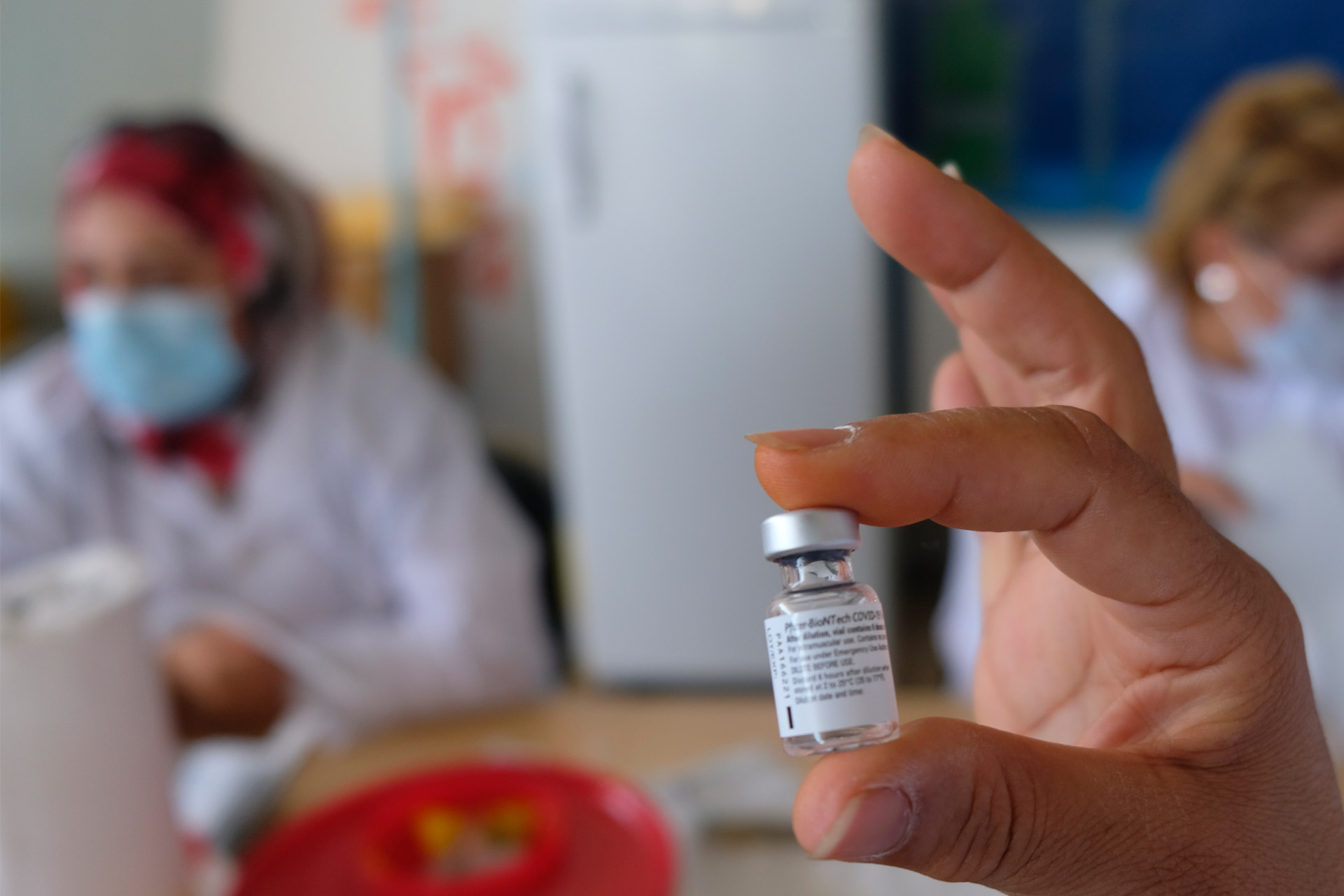
Each Pfizer vial must be diluted with solvent and can provide up to 7 doses.
CONTINUED LOW REGISTRATION NUMBERS
Another factor that is challenging vaccination advancement is that the e-vax platform currently has less than 2.4 million people registered. With an average of about 22,000 registrations per day, the 3 million mark will not feasibly be reached by the end of June.
It is difficult to explain this slow registration process. Many people simply express that they have not registered because they do not consider themselves to be a priority. "I heard that it was the elderly and the health professionals first. It seems to me that we, the tourism employees, have not yet reached our turn", one 34 year old woman working in a travel agency in Tunis says for example.
On the same subject
In this regard, communication from the health authorities seems to have lacked clarity. The insistence on the order of priority led many people to wait until the prioritised categories had been vaccinated before registering, whereas the e-vax algorithm is designed to do just that on its own.
On the other hand, there are those who either refuse or are hesitant to get vaccinated. In the vaccination strategy that was published in January, the government planned to monitor this phenomenon through "regular opinion surveys", and to adapt its communication campaign accordingly.
The Ministry of Health assures that a polling company has conducted a survey for the government: "Based on this [survey], we are in the process of carrying out local actions. There are mobile campaigns, videos clips with actors and journalists, to encourage people to get vaccinated."
For a few weeks now, videos of prominent figures promoting vaccination have invaded the Ministry of Health's Facebook page and national television. On June 6, a photograph of actress Dalila Meftahi, smiling as a nurse injects her with the vaccine, was shared on the ministry's Facebook page. Below the publication, there were many comments from indignant people, suspecting preferential treatment for the actress, while they themselves were still waiting for a text message to confirm an appointment.

On June 6, the Ministry of Health posted a photo of 61-year-old Tunisian actress Dalila Meftahi on their Facebook page.
General distrust of the State is widespread among those who oppose vaccination.
"There were people who were not eligible to be vaccinated and who [still] were vaccinated. And it's not hard to believe that this is happening, because we live in a corrupt state. I don't want to have anything to do with public health officials. I avoid them, the police, and the tax department officals... the public administration in general", exclaims a forty-year-old technician in Bizerte, who is refuses to get vaccinated.
For these people who distrust institutions, the media coverage of the vaccination of public figures can often reinforce the feeling that certain sections of the population benefit from advantages because of their position, thus merely fuelling their preexisting lack of confidence in public institutions.
Seif, a pharmacist in the Rades centre, is confronted with this problem on a daily basis. "Many people don't trust the medical staff. Sometimes it takes me fifteen minutes in an interview to convince someone of an obvious piece of information", he remarks.
Lack of a LONG-TERM STRATEGY
Confronted with a delay in the vaccination campaign, the advisor to the Minister of Health, Inès Ayadi, responded by stating that the objective of three million people vaccinated by the end of June was no longer on the agenda: "People have forgotten that the objective was presented in terms of the vaccines that we should have received. Since there is a delay and even a shortage of vaccines, the objectives have changed. The availability of the vaccine goes far beyond the Ministry of Health, it depends on the international market. The objectives are to vaccinate as soon as we receive a vaccine."
In the absence of a long-term strategy, the Tunisian government is opting for day-to-day vaccinations, according to supply availability. According to Inkyfada's projections, if the vaccination campaign continues at this pace, it will take until October 30, 2021 - a four month delay - to reach the government's objective of vaccinating 3 million people.
